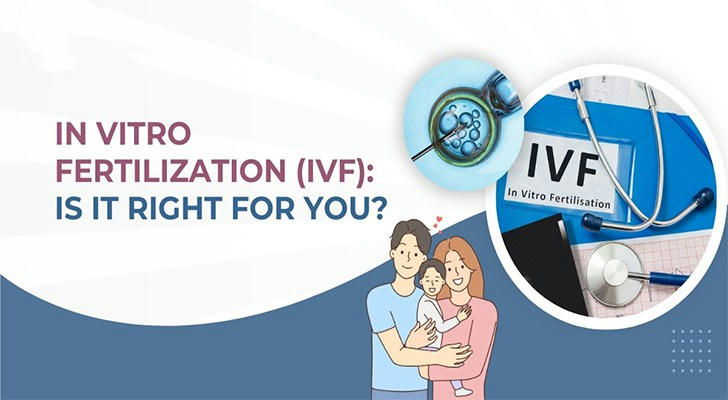Is IVF Right for You? What You Need to Know About Infertility Treatments
Infertility can be a heartbreaking and isolating journey for many couples hoping to start a family. It’s often a process filled with emotions, medical terms, and complex decisions. One of the most widely known and sought-after treatments for infertility is in vitro fertilization (IVF). But how do you know if IVF is the right path for you and your partner? In this article, we’ll break down the essentials of IVF, who it might be right for, the process itself, and the potential benefits and risks.

What is IVF?
In vitro fertilization (IVF) is a form of assisted reproductive technology (ART) used to help couples who have difficulty conceiving a child. The process involves retrieving eggs from a woman’s ovaries and fertilizing them outside the body with sperm in a laboratory. Once fertilization occurs, the resulting embryos are then transferred to the woman’s uterus with the goal of achieving a successful pregnancy.
IVF is often recommended when other infertility treatments have not worked or when the cause of infertility cannot be addressed through less invasive methods. It’s important to note that IVF is not always the first option for treating infertility—other methods such as medication, intrauterine insemination (IUI), or lifestyle changes may be considered first.
When Is IVF Recommended?
IVF is typically recommended for individuals or couples experiencing the following conditions:
Female Age and Egg Quality: Women over the age of 35 may experience a decline in fertility, including a reduction in egg quality. IVF can help address this issue by allowing doctors to select the healthiest embryos for implantation.
Blocked or Damaged Fallopian Tubes: If a woman has blocked or damaged fallopian tubes, IVF can bypass this issue, as fertilization takes place in the lab rather than in the fallopian tubes.
Male Infertility: IVF can also be used when male infertility is present, such as low sperm count or poor sperm motility. In some cases, sperm can be retrieved directly from the male reproductive system for use in IVF.
Unexplained Infertility: Sometimes, couples struggle to conceive without any clear reason. In such cases, IVF can be an effective option to achieve pregnancy.
Genetic Disorders: If there’s a risk of passing on a genetic condition, IVF can be used in conjunction with preimplantation genetic testing (PGT) to screen embryos for specific genetic conditions before implantation.
Same-Sex Couples or Single Parents: IVF allows same-sex couples or single individuals to have biological children through the use of donated sperm or eggs.

The IVF Process: Step by Step
Understanding how IVF works can help you feel more informed and less anxious about the process. Here’s a step-by-step breakdown of what to expect:
Ovarian Stimulation: The first step in IVF involves stimulating the ovaries to produce multiple eggs. This is done through a series of hormone injections that help the eggs mature. Regular monitoring with blood tests and ultrasounds is necessary to track egg development.
Egg Retrieval: Once the eggs are mature, they are retrieved from the ovaries using a needle inserted into the ovaries under sedation. This procedure typically takes about 20 minutes and is done under local anesthesia or light sedation.
Fertilization: The retrieved eggs are then combined with sperm in a laboratory dish. If there are concerns about sperm quality, a procedure called intracytoplasmic sperm injection (ICSI) may be used, in which a single sperm is directly injected into an egg.
Embryo Culture: The fertilized eggs are monitored for several days to assess their development. The embryologist will choose the best-quality embryos for transfer based on their growth and appearance.
Embryo Transfer: After a few days of growth, the selected embryos are transferred into the woman’s uterus. This is a relatively simple procedure, done with a thin catheter, and usually doesn’t require anesthesia. Sometimes, multiple embryos are transferred to increase the chances of pregnancy.
Pregnancy Test: About 10 to 14 days after the embryo transfer, a blood test is performed to determine if implantation has occurred. If the test is positive, further monitoring is done to ensure the pregnancy is progressing.
Success Rates of IVF
IVF success rates vary based on several factors, including age, fertility diagnosis, and the clinic’s expertise. Generally, younger women have higher success rates with IVF, as egg quality tends to decline with age. According to the American Society for Reproductive Medicine (ASRM), the success rate for IVF varies between 40% to 50% for women under 35, but it decreases for women over 40.
It’s also important to consider that multiple IVF cycles may be needed to achieve a pregnancy. Success may require several attempts, and the journey can be emotionally and financially draining.
IVF Costs and Insurance
The cost of IVF can be significant, with an average cycle ranging from $12,000 to $15,000 in the United States. This doesn’t include medications, lab fees, or additional services like egg or sperm donation. Insurance coverage for IVF varies widely, with some plans covering the treatment and others offering no coverage at all.
It’s essential to research and plan for the financial aspect of IVF, as multiple cycles may be necessary. Some clinics offer payment plans or financing options to help alleviate the burden.
Benefits and Risks of IVF

Benefits:
IVF offers the chance for couples to have a biological child, even when faced with fertility challenges.
It provides an opportunity to screen embryos for genetic conditions, reducing the risk of passing on inherited disorders.
IVF can help overcome fertility issues that may not have been treatable by other methods, such as blocked fallopian tubes or severe male infertility.
Risks:
IVF carries risks, including ovarian hyperstimulation syndrome (OHSS), multiple pregnancies (if more than one embryo is transferred), and potential complications during pregnancy.
Emotional stress can also take a toll, as IVF can be an emotionally challenging and expensive process.
Is IVF Right for You?
Deciding whether IVF is right for you is a deeply personal decision. It’s essential to consider your medical history, emotional readiness, and financial situation. Consulting with a fertility specialist can help you understand your options and create a treatment plan tailored to your specific needs. IVF has helped millions of couples achieve their dream of parenthood, but it’s important to approach it with realistic expectations, patience, and support.
Conclusion
IVF offers a beacon of hope for those struggling with infertility, but it’s not a one-size-fits-all solution. By understanding the process, success rates, costs, and risks, you can make an informed decision about whether IVF is the right choice for you. If you’re considering IVF, consult with a fertility specialist to discuss your unique situation and take the first step toward expanding your family. With the right guidance and support, IVF can be a path to the family you’ve always dreamed of.
